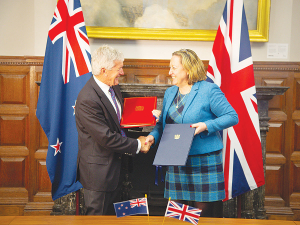Damien O’Connor: NZ united on global trade
When it comes to international trade, politicians from all sides of the aisle are united, says Labour's trade spokesman Damien O'Connor.
 Trade Minister Damien O’Connor and UK Secretary for International Trade Anne-Marie Trevelyan after signing the free trade deal.
Trade Minister Damien O’Connor and UK Secretary for International Trade Anne-Marie Trevelyan after signing the free trade deal.
The new Free Trade Agreement (FTA) between New Zealand and the United Kingdom is being hailed as being so good and comprehensive that it's unlikely to be surpassed by any future deals.
That's how Export Growth and Trade Minister, Damien O'Connor, described the deal when he spoke to Dairy News from London just after signing the deal last week with his counterpart, the UK's Secretary of State for International Trade Anne-Marie Trevelyan.
O'Connor says the FTA is a "spectacular" agreement, which sees the phasing out of all tariffs on all NZ's core export goods and opens the door for services and all other areas of trade between the two countries.
"Primary producers should be very happy with this deal and the chances of taking up all of that free quota in the transitional period is probably low, and then beyond the phase-out period, we have unlimited access so it doesn't get much better than that," he says.
"It would be hard to think that we would get other FTA's to that standard, but we will keep trying," he says.
O'Connor says while the phase out periods might extend out for beef and sheepmeat, it's unlikely NZ will meet the initial thresholds. So effectively it's tariff free access into this market when the FTA comes into force - hopefully by the end of this year.
Part of the success of putting the deal together, says O'Connor, was due to the strong traditional links with the UK. Also their enthusiasm to be a part of CPTTP (Comprehensive and Progressive Agreement for Trans-Pacific Partnership) and to engage in the Pacific meant they were keen to get this deal over the line.
"My counterpart Anne-Marie Trevelyan has been an enthusiastic advocate and supporter of the deal. She sees the value of this and the UK reconnecting with the rest of the world, especially NZ and Australia, who are long-time loyal partners in many things."
Now to the EU
As Dairy News spoke to Damien O'Connor, he was heading off to Brussels to try and persuade the European Union to produce an equally good FTA.
He says while they are two separate agreements, obviously the EU one is much more complex, given the fact that it needs the approval of all 27 member states.
"But we are still hoping that like the UK they will have the enthusiasm to connect with likeminded countries in a challenging geopolitical world. And to have secure trade links with countries that share our aspiratons around climate change, reduction of emissions, animal welfare standards, labour standards. We hope that they see the value in connecting with us even though we are a relatively small player," he says.
O'Connor admits the Ukraine crisis may somewhat overshadow the FTA talks, but points out that even in times like these, other business still goes ahead as it has done through the Covid pandemic.
He says trade liberalisation is one way of solving some of the world's problems.
The National Wild Goat Hunting Competition has removed 33,418 wild goats over the past three years.
New Zealand needs a new healthcare model to address rising rates of obesity in rural communities, with the current system leaving many patients unable to access effective treatment or long-term support, warn GPs.
Southland farmers are being urged to put safety first, following a spike in tip offs about risky handling of wind-damaged trees
Third-generation Ashburton dairy farmers TJ and Mark Stewart are no strangers to adapting and evolving.
When American retail giant Cosco came to audit Open Country Dairy’s new butter plant at the Waharoa site and give the green light to supply their American stores, they allowed themselves a week for the exercise.
Fonterra chair Peter McBride says the divestment of Mainland Group is their last significant asset sale and signals the end of structural changes.
President Donald Trump’s decision to impose tariffs on imports into the US is doing good things for global trade, according…
Seen a giant cheese roll rolling along Southland’s roads?